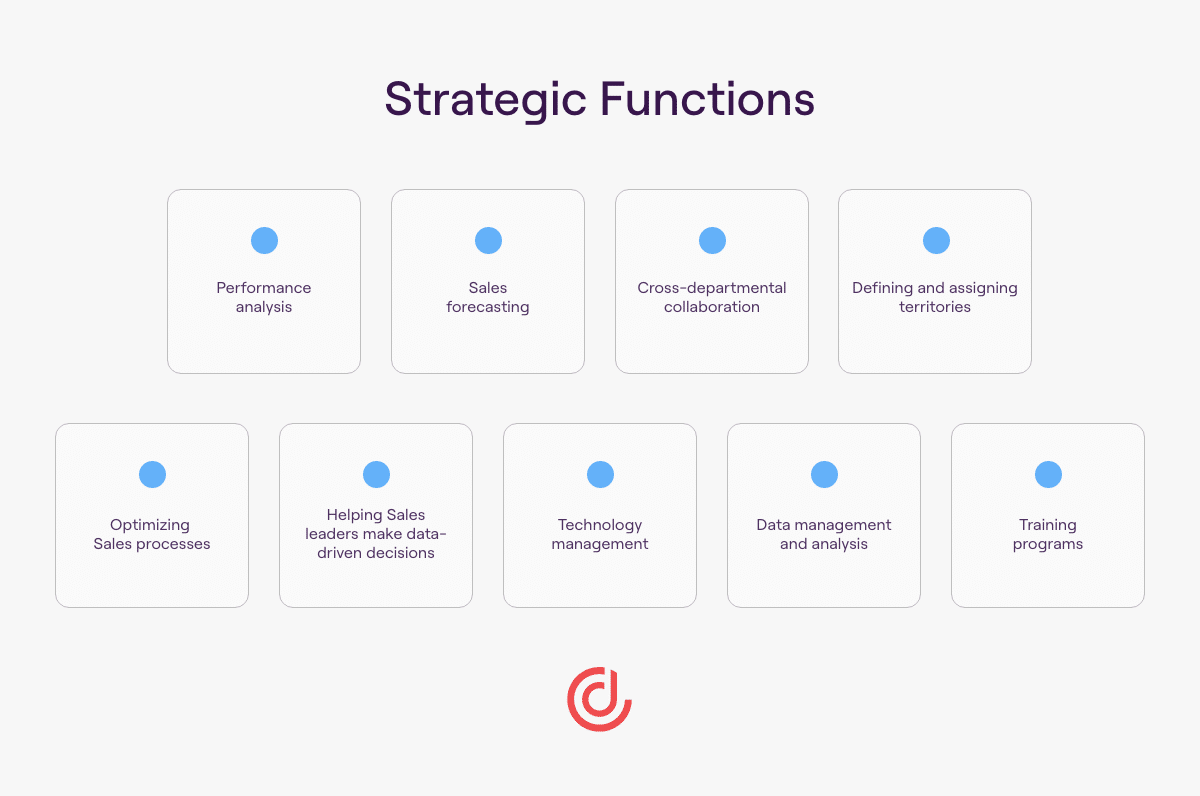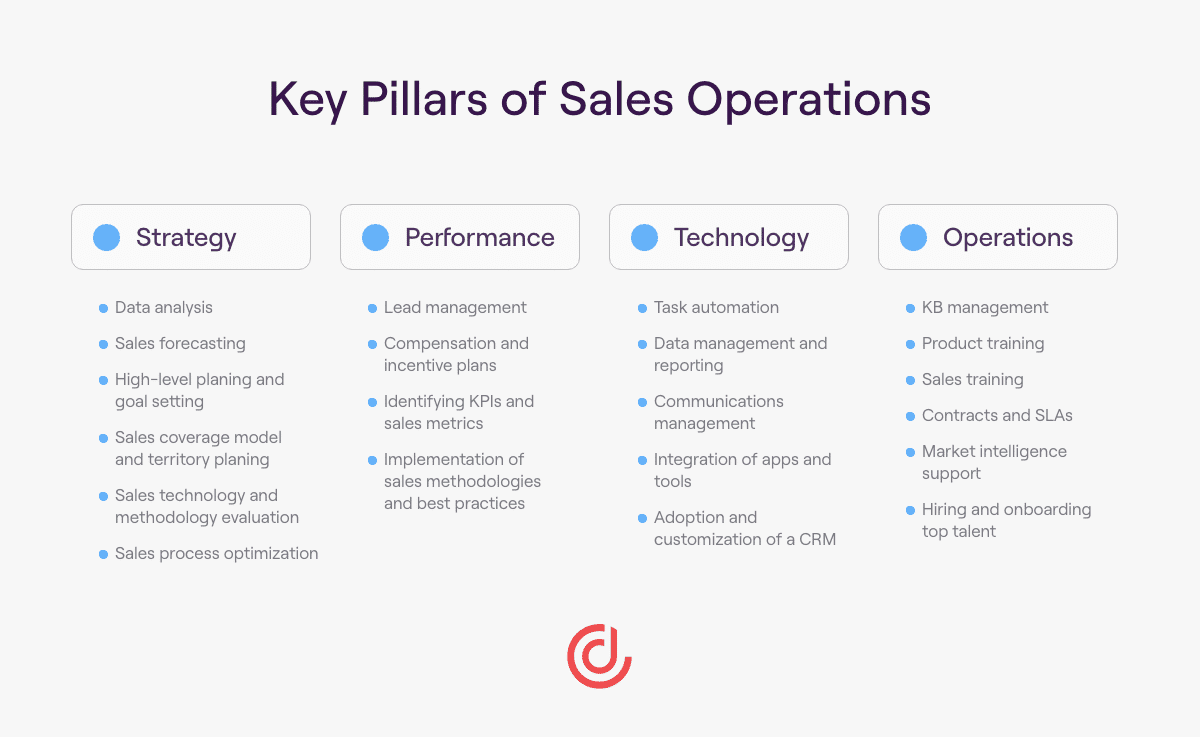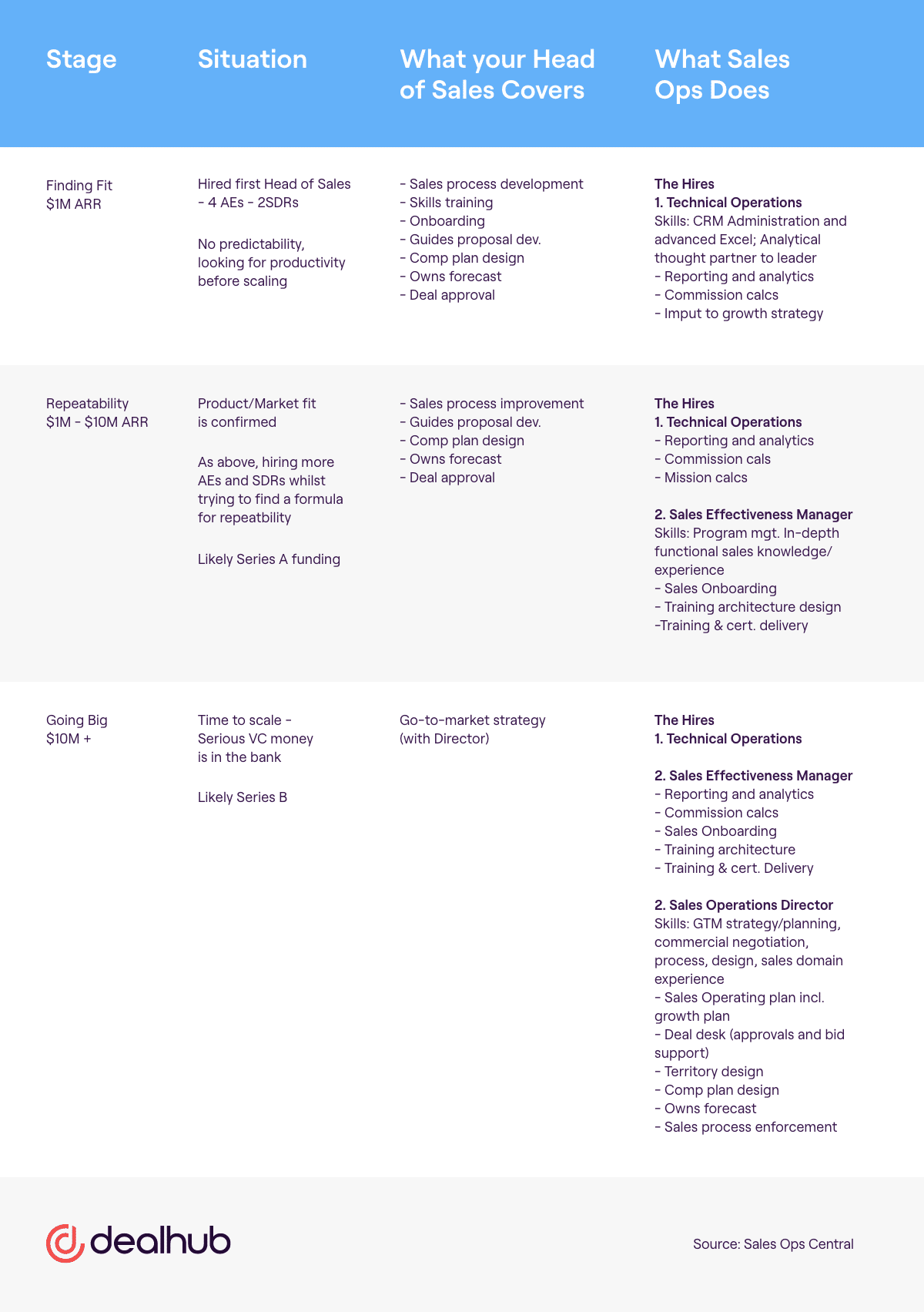Sales Operations (Sales Ops)
Table of Contents
What is Sales Operations?
Salespeople are usually the “face” of the sales cycle – working with the customer to define and offer solutions that improve their organization’s performance. To do their job more efficiently, Salespeople rely on technology, processes, data analysis, and marketing interfaces to help accelerate their deal cycles and guide them to successful outcomes.
The tools that help Salespeople drive deals forward can also come with major challenges – data in the CRM needs to be maintained, processes need to be created and optimized, Sales technology requires research, selection, and management, and the right analytics need to be gathered and processed.
Enter Sales Operations who support and enable the Sales team to sell more effectively by managing all of the non-selling tasks of the sales process, reducing friction wherever possible, and providing strategic guidance. Sales Operations (also known as Sales Ops) drives revenue and helps Sales teams close deals faster by promoting operational efficiency and freeing Sales from internal and administrative duties to give them the opportunity to focus on the customer.
Synonyms
- Sales ops
- Sales support
- Business operations
Sales Operations Adoption
What is the market adoption of the Sales Operations role?

Benefits of Sales Operations
What key challenges does Sales Operations help businesses overcome?
The overall goal of Sales Operations is to reduce as much friction as possible in the Sales process to allow reps to maximize their selling time and increase Sales productivity. But what are some of the specific challenges that Sales Operations help solve in order to help organizations grow their revenue and profits?

Eliminate “Selling Thieves”
“The unspoken, overall goal of sales operations, is to reduce or eliminate selling thieves. Any process that takes the salesperson out of the field, or off the phone, or away from selling, is a sales thief.” Jeffrey J. Fox, Founder of management consulting firm Fox and Company.
Sales Ops is responsible for assessing and providing solutions to those processes that are “Selling Thieves”. This usually includes automating or taking on administrative tasks that Salespeople are tasked with. A great example of this is quote generation. In many organizations, the process of creating a quote is a huge time drain due to manual processes and stand-alone tools such as Excel.
Solutions such as CPQ (Configure, Price Quote), can help to automate the process. Research shows that CPQ can help reduce Sales cycles by 13%, increase revenue by 48% and improve margin growth rate by 57% (Aberdeen).
Simplify Data Interpretation
Sales Executives rely heavily on execution from their Sales team to reach results. However, many Sales organizations have a generous amount of data at their disposal which can help them to optimize productivity, improve the performance of sellers, and increase revenue.
The issue is compiling and organizing the data into useful dashboards that Sales Managers can interpret effectively and take appropriate action.
Being the analytical heroes that they are, Sales Ops can help manage the labyrinthine of information to create, and continually optimize effective dashboards and define correct KPIs in terms of Sales use cases and other business units as well.
Optimize Processes Across Business Units
Many times deal cycles stall due to the sales organization’s inability to align with other business units they are dependent upon in order for deals to move forward.
Sales operations play a key role in smoothing out those road bumps by defining and optimizing processes where Sales continuously align with diverse functions in an organization.
An example of sales process optimization would be setting up automated approval workflow processes between Sales and other business units such as Finance, Engineering, Legal, Marketing, and Management.
Facilitate One-on-One Manager/Rep Reviews
An effective one-on-one between the Sales Manager and rep can have a major impact on sales performance and helps reps better understand and motivate them to desired behaviors.
An effective manager-seller conversation improves commercial performance by explaining things in a way sellers understand and motivating them toward desired behaviors.
Despite the positive impact one-on-ones have, Sales managers struggle to have these conversations. Sales operations can provide guidelines on when it is best to have these sessions, what topics are most relevant, and provide the tools necessary to personalize the discussions.
Sales Operations Best Practices
What are Sales Operations best practices?
While each organization has its unique needs, common underlying principles guide many Sales Operations processes.
Define a Mission Statement
Keep the Sales team focused with a clear and concise mission statement that supports your organization’s goals and sales strategy.
Identify KPIs and Sales Metrics
We identified some common KPIs in this article that can help, each organization has its unique perspective on what key metrics are important. Make sure your team understands what sales metrics are measured and why.
Champion the Right Technology
Evaluate your team’s existing and developing needs and define functionalities that can help improve their Sales productivity. Choose solutions that can consolidate multiple capabilities, will scale with your business, and provides excellent support.
Collaborate with Other Departments
The role of Sales Operations is evolving and their role in organizational strategy is a pivotal one. Therefore it is vital to put processes in place that align sales data with multiple business units.
Invest in Future Growth
Artificial Intelligence is making its way to every facet including the Sales process.
Automation and AI will enable sales process optimization and provide new opportunities for you to improve Sales productivity, shorten Sales cycles, and ultimately increase revenue for your organization.
Measuring Sales Operations
Which Sales Operations KPIs & metrics do you need to measure?
KPIs are a key component for Sales Operations to measure if processes and models put in place are working and also show weaker links where those processes can be optimized. Here are some commonly used KPIs that evaluate and improve organizational results.
Churn rate is calculated by dividing the number of sales made by the number of people pitched within a given period. It not only shows how effective the Sales team is, but how effective are the Sales Operations processes that guided the Sales team during the engagement with the customer.
The amount spent on Marketing and Sales activities to acquire new customers over a given period of time. It is a delicate balance of finding the most cost-effective way to get leads without compromising on their quality.
The number of members of the Sales team who were able to achieve 100% of their quota.
How long does it take to close a deal? This metric is vital as Sales Operations are continually searching for solutions such as CPQ and Contract Management to accelerate this cycle.
How much time Salespeople actually spend selling as opposed to other tasks such as meetings, administrative work, etc. The goal of the Sales Operations is to optimize the amount of time that the Sales team has to sell.
How much money can be made from a customer over a period of time and how can that amount increase without having to bring in new customers.
How long it takes for a lead to respond to some sort of reach-out initiative.
The value of the Pipeline at any given point in time. This metric helps Sales Operations make forecasts.
The actual sales results vs. the predicted results based on data in the pipeline. This is vital to Sales Operations because if there is a big discrepancy, it could signal errors in the accuracy of data that the sales forecasting is based upon and requires more in-depth analysis.
Defining the Sales Operations Role
What are Sales Operations’ roles and responsibilities?
Depending on the size and culture of the organization, the responsibilities of Sales Operations can vary from company to company. But at its core, many Sales Ops departments have similar roles and follow certain standard working processes aimed to fine-tune the entire Sales process. Sales Operations duties are usually a mix of both strategic and tactical:

Some of the Strategic Functions Include:
Sales Ops optimizes sales processes by implementing methodologies, technologies, and best practices.
Sales Ops helps sales managers improve sales performance by finding areas that need tweaking or helping Sales leverage the activities of the highest performing sales reps.
Sales Operations are responsible for researching and integrating a Sales Stack – a set of digital platforms that work together to help improve sales team efficiency. Since each organization has different needs, Sales operations add value by finding those solutions that work best for their organization and help Sales accelerate their deal cycle.
Some examples include tools that can help reps automatically log data in the CRM, direct callers to the right reps, prioritize and score sales leads, save time in creating price quotes and managing contracts, predict which companies to target and more. Sales operations often work with sales managers, sales enablement and the IT team to coordinate which solutions are most suitable for the organization.
Using data to determine the effectiveness of tools and processes for peak productivity and effectiveness
Sales operations oversees and implements a variety of training programs. Whether it is for veteran teams members to help them make the most of their CRM and Sales Stack, for new Sales reps who are coming into the organization or training on new tools, Sales Operations is responsible for assuring that the Sales team have the knowledge they need to derive value from the tools and processes that are meant to help them.
Sales operations analyze ways to improve the productivity of Sales teams by eliminating barriers, restructuring the team if necessary, providing lead management, identifying KPIs, and implementing best practices.
Sales Operations analyze data to help an organization predict revenue and identify bottlenecks that if addressed can be a catalyst for growth.
Sales operations works together with other departments to make sure that goals are aligned, and provides input on the process and progress.
Sales operations will assign territories for each Sales rep.
Tactical Sales Ops Functions can Include:
Sales operations teams are responsible for maintaining customer relationship management (CRM) systems and ensuring that all the necessary sales data is captured, stored, maintained, and updated in a timely fashion. This includes maintaining data hygiene, automating data capture, and accurately tracking lead lifecycle stages.
Sales operations teams manage lead generation activities, which involve collecting and qualifying leads to ensure they meet the criteria set by sales and marketing. To do this, sales operations teams must establish efficient processes for identifying and qualifying leads, and then passing them on to the sales team. Often, they use software to automate this process.
Sales ops sets up dashboards to provide sales teams with a comprehensive overview of their performance, allowing them to make informed decisions and identify areas of improvement to maximize revenue and profits. Sales dashboards clearly display all the critical metrics, such as lead conversion rates, average customer lifetime value (LTV), win/loss ratios, customer acquisition costs (CAC), and more. Sales operations teams use this data to monitor progress, measure performance, make changes when needed, and spot trends that can help inform strategic decision-making. With a sales dashboard in place, teams have the correct information at their fingertips to drive success.
Sales operations teams are responsible for managing the sales process from beginning to end and automating it whenever possible. Automation can improve efficiency and accuracy, reduce time spent on administrative tasks, and free up resources for more critical work. By automating processes, sales teams can better keep up with their workloads, increase their effectiveness and productivity, and even reduce costs. Automated processes can also provide more accurate data across departments and sales tools and help teams track performance metrics over time to determine which strategies are working and which ones need to be adjusted.
Sales operations teams manage pricing and contracts within a company’s CPQ (configure, price, quote) software. This system determines how customers can configure products, how the prices for those products are determined, and how contracts are generated.
Sales operations teams use CPQ to help customers generate accurate pricing quotes quickly and cost-effectively. By having this system in place, it allows sales teams to streamline their processes and interactions with customers while also ensuring they provide accurate and consistent pricing across multiple sales channels.
Sales operations leaders manage and oversee the training, recruiting, onboarding, and ongoing development of sales personnel. The primary focus of a sales operations team is to ensure that all sales representatives have the tools, strategies, and skills to perform their job effectively.
The Value of Sales Operations
Why is Sales Operations important?
At its core Sales Operations ultimately has one goal – to help Salespeople close more deals faster. So a large part of the success and increase in revenue rests squarely on Sales Ops shoulders. However, in today’s ever-evolving sales landscape, a lot of things have to happen and processes need to be completed before a Salesperson can actually make a call. That is where Sales Operations comes in.
Sales today is about more than just hitting targets. Management is continually appraising the increased cost of sales, longer buying cycles, higher customer awareness, and competition. In addition, technological advances are changing the way businesses compete.
Sales Ops are not only tasked with finding the solutions that will optimize sales processes, but also with building a structured process that helps sales reps succeed and drive the company’s revenue and growth forward.
Building a Sales Operations Team
What are the characteristics of successful Sales Operations teams?
As mentioned before, the key goal of Sales Operations team is to support and enable the Sales team so they can focus on selling. As the organization expands, the roles and characteristics of Sales Operations evolve but there are common personality traits that are beneficial when a company hires a Sales Operations Manager and builds a Sales Operations organization.
- Communicative and articulate. A Sales Operations professional needs to coordinate and align with business units and personnel on many levels (from junior level to executive). They need to be able to communicate sales strategy and break down data in a way so their audience understands the significance of it and sometimes even change minds.
- Analytically oriented. A big part of the Sales Operations role is to look at different types of data in different formats, organize it in a way that is digestible, and offer conclusions that can help optimize processes in the organization. The data is the heart of most optimization processes so a successful Sales Operations professional is one who is comfortable “getting their hands dirty” with data.
- Amiable. Sales Operations are connected in one way or another to almost all business units in an organization. Therefore the ability to build relationships at many levels is a crucial part of the Sales Operations role.
- Technically oriented. Many times Sales Operations are called upon to be creative in offering solutions that did not exist before. Having a technical background and some developer experience can be useful when analyzing and implementing sales technology that is meant to improve efficiency.
- Logical. Sales Ops teams build workflow processes and need to understand the logical steps the workflow needs to progress through.
- Resolute. Sales Operations need to have a strong personality to be able to stick to frameworks that make sense for the organization despite the desires or whims of different business units.
- Curious. Piecing together data to tell a story is an art form and there are many ways to do it. A successful Sales Operations will be curious about the data itself and continually think of how to mold it so it conveys a message.

Different stages of organizational growth require different hiring stages within sales operations departments.
In his post Building Sales Operations Within Your Start-up, Matt Cameron, recommends which Sales Operations functions your organization should hire at different growth stages according to Annual Recurring Revenue (ARR).
Up to 1 million ARR
At this stage, most organizations are small operations, and the Sales Ops role will be more technical – many times 1 person. While still small, it is a good opportunity to lay the groundwork for growth by aligning business units from the get-go. The hire(s) should be able to take on administrative responsibilities and free up time for the Salespeople. It should be someone with advanced Excel skills and the ability to serve as an analytical partner. At this stage the Sales Operations organization will be responsible for:
- CRM Administration
- Reporting and Analytics
- Commission Calculations
- Providing input to growth strategy
From $1M to $10M ARR
As the organization grows it should consider adding on a “Sales Effectiveness Manager” who will be able to offload many of roles that are filled by a Sales Manager when the company was smaller, this includes:
- Sales Onboarding
- Training and architecture design
- Sales training and certification delivery
The Sales Effectiveness Manager should have in-depth functional sales knowledge and experience, and also possess program management experience.
$10+M ARR
At this point, the Sales Effectiveness Manager will take on even more roles including:
- Reporting and analytics
- Commission Calculations
In addition, the organization should look to hire a Sales Operations Director who will be responsible for:
- Go-to-Market Strategy
- Process design
- Planning commercial negotiation
- Sales operation and growth plan
- Deals desk
- Territory and compensation plan design
- Sales process enforcement
- Owning the sales forecast

Content for Sales Operations
What key resources should every Sales Operations leader have?

Sales Operations Guide 2020
Includes new research data on the sales operations trends that impact the way sales teams increase efficiency and productivity while improving deal collaboration and customer relationships.

How to Consolidate Your Sales Stack
Consolidating your sales stack enables you to reduce training time, cut administrative costs, and focus on effective sales tools that tie directly into your deal stages.

G2 CPQ Momentum Report
G2 Momentum Grid® provides a view of those industry leaders who have made a significant impact on the CPQ Market in the last year.
Sales Ops vs. Sales Enablement
Sales operations and enablement are both important for ensuring that a company meets its sales goals. In many organizations, sales enablement is a function of the Sales Operations department.
The main difference between sales operations and sales enablement is that sales operations is a department within a company that is focused on the sales process and ensuring that sales goals are met. In contrast, sales enablement is focused on helping salespeople sell more effectively.
Sales operations are responsible for developing and executing a company’s sales operations strategy, managing the sales process, including tasks such as setting up CRM systems, creating sales reports, and managing leads. On the other hand, sales enablement is responsible for providing salespeople with the resources and training they need to succeed. This may include creating marketing materials, developing training programs, and providing access to market research.
Sales Operations Team Roles and Structure
The Sales Ops team is responsible for ensuring that the sales organization is running smoothly and efficiently. In addition, they are accountable for things like managing the sales pipeline, analyzing data, and providing support to sales reps.
Sales Operations Team Structure
The team typically consists of a sales operations manager and sales operations analysts. The manager is responsible for leading the team and setting the direction, while the analysts are responsible for carrying out the day-to-day tasks. The sales operations team plays a vital role in the success of a sales organization, and the team must be properly structured in order to be effective.
A sales operations team can be structured in a few different ways. One common structure is to have a dedicated sales operations manager and a team of analysts who report to them.
Another typical structure is to have a sales operations manager and a team of analysts who report to the head of sales or Chief Sales Officer. This can be effective if the director of sales is very involved in the operations of the sales organization.
Another option is to have a dedicated sales operations team that reports directly to the CEO. This can be a good option for companies where sales are a critical part of the business.
Sales Operations Roles
Roles within the Sales Ops department include:
- Sales Operations Analyst
- Sales Ops Channel Support
- Sales Operations Manager
- Partner Operations Project Manager
- Head of Sales Operations
- Director of Sales Ops
- Chief Sales Officer
Make DealHub CPQ Part of Your Sales Process
Our Revenue Platform is designed as an extension of your Sales Operations workflow within your CRM. Allowing you to manage your entire deal flow from one location – with zero gaps in your view of the buyer journey.
Making sales teams more efficient and productive: DealHub integrates seamlessly within Salesforce CRM, Microsoft Dynamics 365, Hubspot, Freshworks, and Sugar CRM. All fields feature bi-directional synchronization so your information is updated in real-time.
DealHub CPQ Integration with Your CRM
When you can manage your entire deal flow within your CRM, there’s no risk of losing crucial information. Your CPQ should be an extension of your sales operations workflow, native within your CRM. DealHub CPQ integrates seamlessly with Salesforce, Microsoft Dynamics 365, Hubspot, Freshworks, and Sugar CRMs. All fields feature bi-directional synchronization so your information is updated in real-time.
We invite you to take a look at how DealHub stacks up against other CPQ vendors rated by users on G2 Crowd.
You’ll see how DealHub has been named the Highest Performer, and how our solution ranked best in the CPQ Software Category in the following categories:
- Best Usability
- Best Support
- Easiest Setup
- Easiest to Use
- Best Relationship
- Best Meets Requirements
People Also Ask
What is the role of a sales operations manager?
Sales operations managers play a key role in ensuring the smooth and efficient operation of a company’s sales department.
They are responsible for managing and coordinating the activities of the sales operations team, as well as developing and implementing sales ops processes and strategies to improve overall sales performance.
In addition, sales operations managers also provide support to individual sales members by providing them with information and resources, and by troubleshooting any issues that may arise. By effectively managing the sales department, operations managers can help to ensure that a company meets its sales goals and objectives.
What department does sales operations report to?
Sales operations report to the Chief Revenue Officer (CRO).
The CRO is responsible for the company’s overall sales strategy and performance. Sales operations is responsible for ensuring that the sales team has the resources and support they need to meet their goals. This includes things like providing data and analytics, developing training programs, and managing customer relationships.
What is the difference between sales and sales operations?
Sales operations are responsible for the day-to-day management of the sales department. This includes tasks such as setting sales targets, managing the sales pipeline and ensuring that sales activities are aligned with the company’s overall strategy.
Sales, on the other hand, is responsible for generating revenue through the sale of products or services. Sales teams are typically composed of individual salespeople who are responsible for prospecting, building relationships, and closing deals.
The two departments are closely linked, and both are essential to the success of any organization. However, it is important to understand the difference between the two in order to ensure that they are properly aligned and working together towards common goals.
What makes a successful sales operations strategy?
Sales operations strategies can vary depending on the company, product, or service being sold. However, there are some key elements that are essential for any successful sales operations strategy.
1. Set Achievable Goals
One of the most important aspects of a successful sales operations strategy is setting achievable goals. Without specific and measurable sales productivity goals, it will be difficult to gauge the success of the sales operations strategy. Additionally, goals should be aligned with the overall business strategy to ensure that they are in line with the company’s objectives.
2. Effective Resource Allocation
Another critical element of a successful sales operations strategy is effective resource allocation. Sales operations need to have a clear understanding of the resources that are available and how best to utilize them. This includes everything from financial resources to human capital. If resources are not used effectively, it will be difficult to achieve the desired results.
3. Define Clear Sales Operations Processes
Finally, another important part of any successful sales operations strategy is having clear sales operations processes in place. This process should be designed to meet the specific needs of the company and the products or services being sold. Without a clear and defined process, it will be difficult to ensure that the sales operations strategy is being executed effectively.
These are just a few of the key elements that are essential for any successful sales operations strategy. By focusing on these areas, companies can ensure that their sales operations strategies are more likely to be successful.







